On the crisp autumn days of late September, the 2025 International Forum on Child Online Protection was held in Beijing from Sep. 25–26 under the theme “Safeguarding Our Future: A Smart Approach to Child Protection and Development in a Digital Era.”
Co-hosted by the China Federation of Internet Societies (CFIS), the Chinese Society of Education, and Beijing Normal University, the event was organized by Beijing Foreign Studies University (BFSU), CCTV.com, and the CFIS Professional Committee on Cybersecurity for Minors, with support from Tencent and Beijing Children’s Legal Aid and Research Center, and funding from the special fund for cybersecurity of the China Internet Development Foundation. Nearly 200 experts from more than 20 countries and international organizations came together to explore global strategies and real-world solutions for child online protection—bringing fresh momentum to creating a safer, healthier, and more supportive digital environment for kids everywhere.
1. Bridging Borders: Building Global Consensus on Child Online Safety
Child online protection doesn’t stop at borders. From tackling cyberbullying and harmful content to using technology for good and creating shared governance, every country eyes the same goal: a secure digital future for the next generation. The opening ceremony and main forum centered on three key areas: digital skills and literacy, safety and responsible technology, and global cooperation and policy. Speakers from around the world shared real-world experiences, crossing borders and fields to build agreement on how to protect kids online and harness global wisdom for their digital growth.
Wang Shoujun, Executive Vice President of Beijing Normal University, set the tone: “The digital revolution—driven by big data, cloud computing, and AI—is sweeping the globe. But risks like harmful content, Internet addiction, and online bullying threaten children’s well-being.” He highlighted China’s strong policies for child protection and called for a united front involving schools, families, society, and tech companies to create a legal, standardized, and science-based system that strengthens both child safety and national digital progress.
On the legal side, Cai Jinfang, deputy Chief Judge of the Civil Adjudication Tribunal No. 1 of the Supreme People’s Court, explained how courts are stepping up. Through policy guidance and judicial recommendations, they hold platforms accountable and build legal safeguards for minors online. The court is also working with agencies to create a national database of child protection cases, sharing proven approaches and offering China’s insights to the world.
“Kids online aren’t just today’s users—they’re tomorrow’s leaders,” said Amna Al Hammadi, Deputy Chief of Mission of Embassy of the United Arab Emirates. She emphasized that protection goes beyond rules and tech: it’s about building digital awareness for everyone. The UAE has rolled out initiatives like the Children’s Digital Wellbeing Pact and the Child Digital Safety Initiative, training children, parents, and teachers to stay safe and smart online.
Exploration in primary education is just as essential. Dou Guimei, Principal of Tsinghua University Primary School, shared how her school is transforming smart campuses into spaces for meaningful learning. “We don’t want children to be passive users of AI,” she said. “We want them at the center—active participants shaping intelligent education.”
On global cooperation, Irina Bokova, former UNESCO Director-General and honorary dean of the School of International Organizations at BFSU, stressed the need for joint efforts: “Children’s rights in the digital age require global rules, multilateral cooperation, and collective action.”
Krzysztof Szubert, Advisor to the Chair of the UN High-Level Leadership Panel on Internet Governance, proposed three key ideas to enhance child online safety. First, he called for the creation of global child-safe Internet standards that uphold fundamental freedoms. Second, he emphasized boosting minor’ digital skills to empower them to navigate the online world securely. Finally, he advocated integrating child protection into tech products from the outset, establishing “technology for good” as the default standard.
2. Real Results: Major Initiatives Launched to Strengthen Protection
Ideas matter, but action makes the difference. The forum delivered tangible outcomes across public programs, educational tools, and technical standards—giving real momentum to child online safety.
A standout moment was the launch of the @Sprout Child Online Protection Public Welfare Action Plan, showcasing how civil society is innovating to keep kids safe.
Chen Aimin, Chair of the CFIS Professional Committee on Cybersecurity for Minors, explained that the plan—started in 2024 by CFIS and over 20 partner organizations—uses “@” to highlight its digital focus and “Sprout” to symbolize children who need care to grow strong. The name @Sprout is a play on words that underscores caring for children and helping them grow healthy and strong. So far, @Sprout has launched 20 projects in six areas: legal education, safety training, digital literacy, support services, research, and international exchange. It has reached over 1 million people online and nearly 30,000 in person across China.
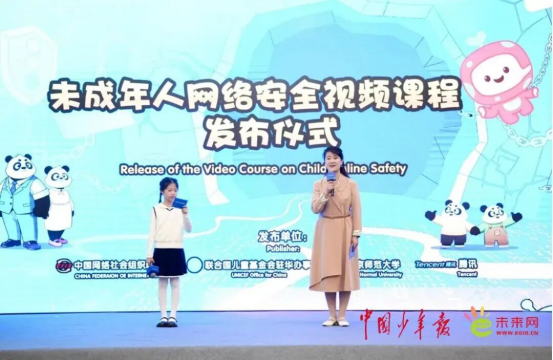
The children's online safety video series Little Sprout’s Cyber Journey was officially launched.
“Worried your child might become overly attached to screens or fall victim to online bullying?” “How can they learn to distinguish real news from misinformation?” To address these common parental concerns, the engaging children’s video series Little Sprout’s Cyber Journey was launched during the forum. It features short animated episodes—three to five for each topic—covering essential areas: staying safe online, responding to cyberbullying, making friends wisely on the Internet, and identifying fake information. Through lively, relatable stories that speak directly to kids, the series helps them build practical safety skills and confidence in the digital world.
The “2025 Report on Child Online Protection” takes a comprehensive look at China’s progress, breaking it down into six areas: legal frameworks, regulation and enforcement, judicial safeguards, platform practices, literacy education, and collaborative governance across society.
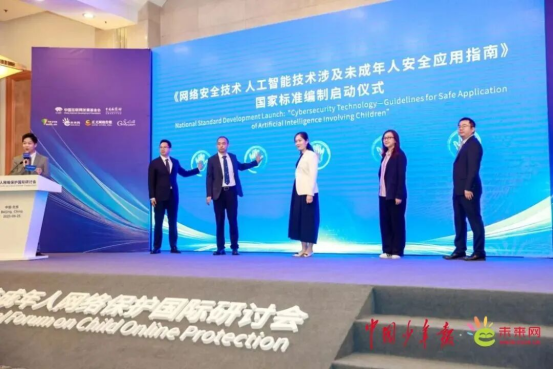
The drafting of the national standard “Cybersecurity Technology—Guidelines for Safe Applications of AI Involving Children” officially began.
The national standard “Cybersecurity Technology—Guidelines for Safe Application of AI Involving Children” officially kicked off its drafting process at the forum. The forum also rolled out supporting activities to move this work forward.
3. Deepening Digital Literacy: Shaping a New AI-Era Education Ecosystem
The AI revolution is reshaping how kids learn and grow, making digital literacy a top priority worldwide. At the sub-forum themed “Enlightening the Future: Jointly Building a New Ecosystem of Digital Literacy in the Age of AI,” participants showcased results, launched initiatives, and brainstormed fresh approaches to prepare the next generation.
Indonesia’s Deputy Minister of Higher Education, Science, and Technology, Stella Christie, noted that while digital tools open doors for youth, they’ve also driven up rates of depression and anxiety among teens globally. She called for united global action to protect young people by teaching critical thinking and information discernment so they shift from passive consumers to confident, self-protecting learners.
“AI isn’t just a tool upgrade or efficiency boost—it’s a fundamental leap in how humans live and work,” said Yu Guoming, a Changjiang Scholar and Chair of the Committee for Media Economics and Management at the Chinese Association for History of Journalism and Mass Communication. In his keynote “Paradigm Shift: The Key to Unlocking the Future in the AI Era,” Yu explained that the real divide in tomorrow’s world won’t be about who has Internet access, but who knows how to ask the right questions. Education, he said, needs to shift from memorizing facts to sparking curiosity, encouraging exploration, and teaching kids to pose smart, thoughtful questions—preparing them to succeed in an AI-driven future.
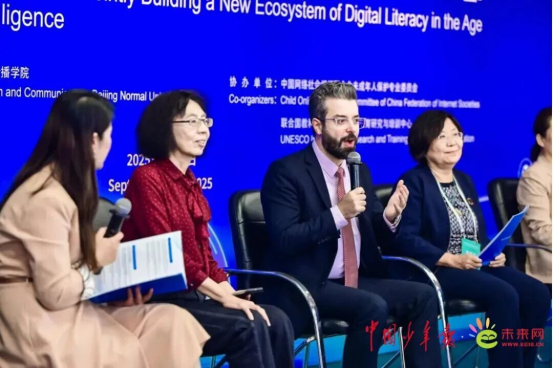
In the roundtable session, experts delved into the theme of building a fresh ecosystem for digital literacy in the AI era. Asad Khalil, Vice Chairman Asia Pacific International Arbitration Chamber, stressed that AI education must balance law, learning, and culture—using AI tools thoughtfully while setting clear guidelines tailored to children’s needs. Bu Wei, a digital literacy specialist from the Chinese Academy of Social Sciences, advocated putting kids at the heart of education: respecting their experiences, distinguishing between basic skills and true literacy, and using hands-on, participatory methods. Zhang Yueying, Principal of Beijing Fangshan Teachers’ College for Vocational Studies, highlighted gaps in rural schools—where digital classes are often sidelined, teachers lack expertise, and left-behind children rely heavily on phones. She explored practical ways to boost digital literacy for rural kids. Other speakers, including Liu Tianyi from UNESCO’s International Research and Training Centre for Rural Education and Weng Qi, Senior Product Manager at Tencent iMA, added diverse insights into minors’ digital education.
The forum also unveiled the Report on Cultivating AI Literacy Among Youth from Beijing Normal University’s School of Journalism and Communication, along with case-study videos from the AI Digital Literacy Public Welfare Program. To cap it off, the Youth AI Education Program officially launched.
4. Safeguarding Online Safety: Strengthening Protections Through Law
As new digital risks emerge, building robust legal protections is more urgent than ever. The sub-forum on Legal Practices in Child Online Protection focused on creating a law-centered safety system to foster a secure, healthy online space for children.
Sixth-grader Guo Ruihan from Beijing Yuying School, speaking on behalf of his classmates, shared a play they had written and performed themselves—Panda Loves Chocolate, inspired by real-life stories—and expressed three heartfelt wishes: that “teen mode” could go beyond simple restrictions to become richer and more engaging; that content be created specifically for them, such as legal education books written in a way children can understand and enjoy; and, most importantly, that they not face blanket bans on screen time, but instead learn how to navigate the online world safely, with parents joining them to learn and grow together.
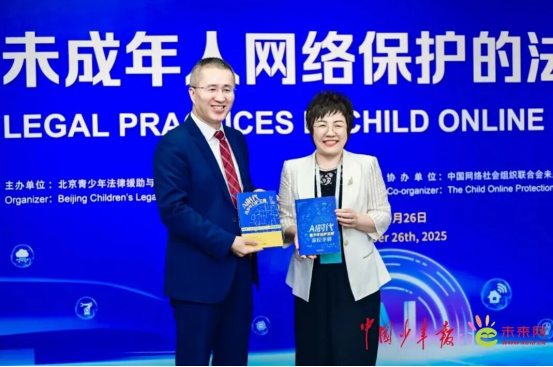
The new book series AI-Era Youth Self-Protection Handbook was officially launched on Sep. 26.
That same day, China Children’s Press and Publication Group launched the AI-Era Youth Self-Protection Handbook series. In the AI age, evolving online threats demand fresh approaches to legal education. This two-book set—co-created with lawyer Tong Lihua’s team at the Beijing Children’s Legal Aid and Research Center—includes Guide to Escaping the Online Maze (for kids) and a Home-School Handbook (for parents and teachers). Lü Yuhong, Deputy Editor-in-Chief at the publisher, explained, “Today’s teens don’t need bubble-wrap protection—they need the skills to navigate, avoid risks, and grow strong in the AI world.” The books are designed to transform protection into real empowerment, turning kids into their own safety captains, thoughtful AI navigators, and mini guardians of the online world. They also bring everyone together—government, schools, families, and communities—to create a strong, united support network for child safety. Tong, one of the authors, explained that legal education needs to connect with today’s kids. The books use real-life examples and interactive puzzles to break down rules into easy steps, helping children develop problem-solving skills and a solid understanding of the law—while providing parents and teachers with simple, practical tips they can use right away.
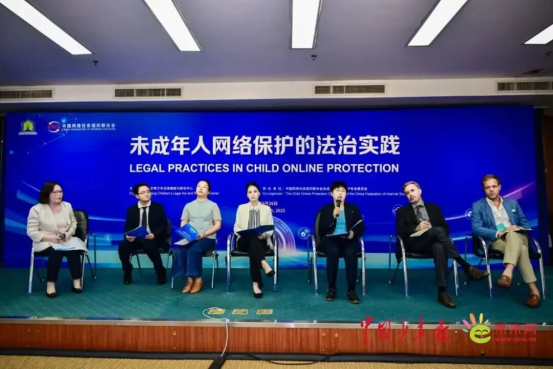
Dora Giusti, Chief of Child Protection at UNICEF China, urged forward-thinking responses to AI-driven risks like cyberbullying, fraud, and distorted content. She called for stronger laws to define harmful behaviors, clarify platform duties in design and transparency, and enable cross-border cooperation. “Countries must team up—sharing successes and strategies—to keep children safe in the digital age,” she said.
In the roundtable session, experts including Li Xuelian from the Ministry of Justice, Teng Sufen from the Communist Youth League, Liu Xiaochun from the University of the Chinese Academy of Social Sciences, and Jeffrey DeMarco, Senior Technical Advisor for Protecting Children from Digital Harm at Save the Children UK, tackled key challenges. They discussed building stronger legal frameworks, applying laws to online violations, and combining legal tools with other protections. The group also explored how to boost collaboration across stakeholders and shape future strategies.
The forum also unveiled the initiative “AI and Global Governance: Building a Human-Centered Framework for Protecting Minors in the Smart Era.” It outlines 12 key principles, including centering protection on children’s rights while matching safeguards to actual risks, and creating ways for kids to have a voice in governance. Together, these build a comprehensive, multi-layered safety net for minors in the digital age.